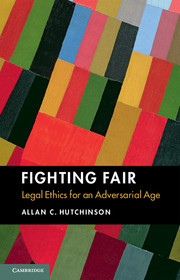9 - Not-So-Final Thoughts
Published online by Cambridge University Press: 05 August 2015
Summary
In this book, I have sought to demonstrate that the existing theory and practice of legal ethics and professional responsibility have been found seriously wanting. In both its traditional and contemporary forms, the deference of the standard model of legal ethics remains more of a threat to than a realization of a defensible account of ethical lawyering. Indeed, their message is doubly dangerous. Not only does it tend to perpetuate a style and substance of lawyering that can be very harmful to the public interest, but it also reassures lawyers that almost anything that they can do for their clients, no matter how dubious the clients’ ends or how compromised the lawyers’ motives or means, is ethical. Moreover, it is considered to be in the public interest as long as lawyers act within the narrow letter of the law. Such an approach is as intellectually bankrupt as it is morally debilitating.
By way of remediation, I have recommended that military ethics has substantial, if surprising potential to improve matters. It supplements and enriches the discursive resources that lawyers can use to address and occasionally resolve ethical challenges that perennially confront them. Instead of legal ethics being little more than a slightly upgraded distillation of contemporary lawyers’ existing practices and established interests, it might fulfill its prime function of offering guidance to lawyers as to what is expected and occasionally required of them in certain situations. In particular, it can help lawyers to develop the moral sensitivity, moral judgment and moral conviction necessary to make a better and more ennobling job of fulfilling their professional role and responsibilities. Except for those who consider that both military ethics and legal ethics are irretrievably oxymoronic in title and substance, a mutual examination of each can be productive.
A CALL TO ETHICAL ARMS
As with any intellectual intervention, it is its practical merit that underwrites its theoretical validity. It is not difficult to float all manner of theoretical notions about legal ethics and professional responsibility.
- Type
- Chapter
- Information
- Fighting FairLegal Ethics for an Adversarial Age, pp. 118 - 126Publisher: Cambridge University PressPrint publication year: 2015



